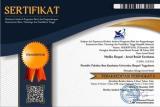PENGARUH SELF EFIKASI IBU MENYUSUI DALAM PEMBERIAN ASI EKSKLUSIF PADA IBU HAMIL TRIMESTER III
DOI:
https://doi.org/10.35842/mr.v16i1.465Keywords:
Breastfeeding Self Efficacy, Self Confidence in Breastfeeding, Husband Assistance, Husband Support, Motivation, Support Health WorkersAbstract
The Effect of Self-Efficacy Breastfeeding Mothers in Exclusive Breastfeeding in Third Trimester Pregnant Women
Background: : The self-efficacy of breastfeeding is a woman's belief in her ability to breastfeed a baby. Confidence owned by someone about something that has not been done that can increase motivation. Objective: To determine the effect of breastfeeding self-efficacy in exclusive breastfeeding for Trimester III pregnant women at the Puskesmas Teras Boyolali Regency. Methods: This research is a quasy experiment with a pre-test and post-test nonequivalent control group approach. Samples were all third trimester pregnant women with 36-40 weeks gestation in the Teras Health Center Work Area. The sampling technique used purposive sampling with inclusion and exclusion criteria as many as 34 respondents in the experimental group 34 in the control group. Data analysis using Wilcoxon signed rank test. Results : Statistical tests using Wilcoxon signed rank test were obtained (p = 0.000 <0.05) meaning that there was a significant effect on self-efficacy of breastfeeding in pregnant women. Conclusion: There is a significant influence on third trimester pregnant women in breastfeeding for breastfeeding self efficacy.
      Â
References
Abuidhail, J., Mrayan, L., & Jaradat, D. (2019). Evaluating effects of prenatal web-based breastfeeding education for pregnant mothers in their third trimester of pregnancy: Prospective randomized control trial. Midwifery, 69, 143–149. https://doi.org/10.1016/j.midw.2018.11.015
Alnasser, Y., Almasoud, N., Aljohni, D., Almisned, R., Alsuwaine, B., Alohali, R., … Alhezayen, R. (2018). Impact of attitude and knowledge on intention to breastfeed: Can mHealth based education influence decision to breastfeed exclusively? Annals of Medicine and Surgery, 35, 6–12. https://doi.org/10.1016/j.amsu.2018.09.007
Ansari, S., Abedi, P., Hasanpoor, S., & Bani, S. (2014). The Effect of Interventional Program on Breastfeeding Self-Efficacy and Duration of Exclusive Breastfeeding in Pregnant Women in Ahvaz , Iran, 2014. https://doi.org/10.1155/2014/510793
As̕adi, N., Kariman, N., Mojab, F., & Pourhoseingholi, M. A. (2017). The effect of Saqez (Pistacia atlantica) ointment on the treatment of nipple fissure and nipple pain in breastfeeding women. Electronic Physician, 9(8), 4952–4960. https://doi.org/10.19082/4952
Astuti, S., Judistiani, T.D., Rahmiati, L., Susanti, I.A. (2015) Asuhan Kebidanan Nifas & menyusui. Jakarta: Erlangga
Awaliyah, S. N., Rachmawati, I. N., & Rahmah, H. (2019). Breastfeeding self-efficacy as a dominant factor affecting maternal breastfeeding satisfaction. BMC Nursing, 18(S1). https://doi.org/10.1186/s12912-019-0359-6
Brockway, M., Benzies, K. M., Carr, E., & Aziz, K. (2018). Breastfeeding self-efficacy and breastmilk feeding for moderate and late preterm infants in the Family Integrated Care trial : a mixed methods protocol, 1–11.
Kemenkes RI. (2017). Profil Indonesia tahun 2016.
Kemenkes RI. (2014). Pusat data dan informasi situasi dan analisis ASI ekslusif.
Khresheh, R., & Ahmed, N. (2018). Breastfeeding self efficacy among pregnant women in Saudi Arabia. Saudi Medical Journal, 39(11), 1116–1122. https://doi.org/10.15537/smj.2018.11.23437
Kronborg, H., Vaeth, M., Olsen, J., & Harder, I. (2007). Health visitors and breastfeeding support: influence of knowledge and self efficacy. European Journal of Public Health;18(3): 283-288.
Lau, C. Y. K., Lok, K. Y. W., & Tarrant, M. (2018). Breastfeeding Duration and the Theory of Planned Behavior and Breastfeeding Self-Efficacy Framework: A Systematic Review of Observational Studies. Maternal and Child Health Journal, 22(3), 327–342. https://doi.org/10.1007/s10995-018-2453-x
Leung, S. S. (2016). Breast pain in lactating mothers. Hong Kong MedicalJournal, 22(4), 341–346. https://doi.org/10.12809/hkmj154762
Liu, L., Zhu, J., Yang, J., Wu, M., & Ye, B. (2016). The effect of a perinatal breastfeeding support program on breastfeeding outcomes in primiparous mothers. Western Journal of Nursing Research: 1–18.
Loke, A. Y., & Chan, L. S. (2013). Maternal Breastfeeding Self-Efficacy and the Breastfeeding Behaviors of Newborns in the Practice of Exclusive Breastfeeding, 672–684. https://doi.org/10.1111/1552-6909.12250
Noel-weiss, J., Rupp, A., Cragg, B., Bassett, V., & Woodend, A. K. (2006). Randomized Controlled Trial to Determine. https://doi.org/10.1111/J.1552-6909.2006.00077.x
Notoatmodjo, S. (2014). Promosi kesehatan dan perilaku kesehatan. Jakarta : Rineka cipta.
Nurafifah, D. (2007). Faktor-Faktor Yang Berperan Dalam Kegagalan Praktik Pemberian ASI Eksklusif, Tesis Magister Gizi Masyarakat Universitas Diponegoro, Semarang, hal. 78-116
Otsuka, K., & Taguri, M. (2013). Effectiveness of a Breastfeeding Self-efficacy Intervention : Do Hospital Practices Make a Difference ? https://doi.org/10.1007/s10995-013-1265-2
Rinata, E., Rusdyati, T., & Sari, P.A. (2016). Teknik menyusui posisi, perlekatan , dan keefektifan menghisap studi pada ibu menyusui di RSUD Sidoarjo. Jurnal RAKERNAS AIPKEMA 2016.
WHO. (2003). Community-based Strategies for Breastfeeding Promotion and Support in Developing Countries. Geneva: WHO.




